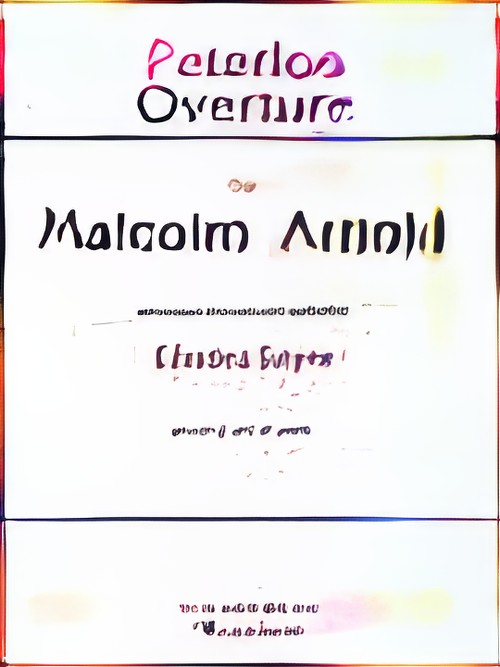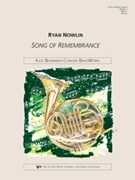Results
-
 £209.99
£209.99La Terre Wind Band Set (Score & Parts)
In the composition 'La terre' several aspects of Earth have been translated into sounds in an associative manner. The first part depicts Nature, Mother Earth, stability, the soil which is the source of life. Earth symbolizes tradition, rituals, fertility. In the music of the composition this can be heard in tonic and ostinato passages. Furthermore, human emotions such as gladness, sorrow, wonder, resignation, hope and despair, indissolubly connected as they are to mankind's life on earth, are musically reflected in sudden gusts of expression. Earth for us human beings is the solid ground on which everything in life takes place. In the second part different moods are evoked in a sort of toccata. Now and then the music sounds fragmented, at other times as a solid whole. The robustness of the music in this part has its roots in the earth, originates from it. It reflects stability and strength, but love and nostalgia are also present in soft and fragile tones. 'La terre' is a musical narrative about Earth, in which music has been given ample room to show its many-sided beauty. 14:00
Estimated dispatch 7-14 working days
-
 £71.28
£71.28Mind Sets
Combining the unique elements of sound effects and aleatory, modal lines and mixed meter, this original Ed Huckeby selection is focused on the three "mind sets" of Chaos, Reflections and Resolution. Programmatic in nature, these three "moods" explore the impact of music on the feelings and emotions of performers and listeners. Outstanding for contest or concert presentation, your performers and audiences will thank you for expanding their musical horizons through "Mind Sets."
Estimated dispatch 7-14 working days
-
 £264.99
£264.99Panoptikum (Concert Band - Score and Parts)
Armin Schaer commissioned this work in his search for a new piece for the tuba. More specifically, he wanted a work that showed off the versatility of this splendid instrument, written in a musical style that is both fresh and modern, while not banishing the orchestra to a simple supporting role. Taking all these specifications into account, Thomas Doss created a work that allows stylistic leaps and is fun, exciting, romantic, and virtuosic, but does not lose sight of the thread that connects the opening measures to the very last.Armin Schaer describes his Panoptikum as follows:Panoptikum is a show of appreciation for my beautiful home and community at Lake Constance, an eventful life, the people that have enriched this life, and a fascinating instrument: the tuba. This work musically embodies the many different moods found around theBodensee - cheerfulness and melancholy, departures and longing, calm and agitation. The roles of the soloist and the orchestra were consciously crafted in a way that does not follow the usual conventions of the genre. The work should spark emotions, address broad segments of listeners, and persuade them of the tuba's ability to be a solo instrument as well as the richness symphonic wind ensembles have to offer. I hope this work enriches the lives of all the soloists and orchestras that cross its path, as well as everyone in the audience who gets to partake! 15:30
Estimated dispatch 7-14 working days
-
 £89.99
£89.99Peterloo Overture (Concert Band - Score and Parts) - Arnold, Malcolm - Sayre, Charles
Transcribed by Charles Sayre. From the warmth of the opening theme to the imitation of terrors of battle, this extraordinary selection captures the full spectrum of musical emotions. Essential for your repertoire! Duration: ca. 9 minutes.
Estimated dispatch 7-14 working days
-
 £118.99
£118.99Petite Suite Franaise (Waignein) (Concert Band - Score and Parts)
This spirited work by Andre Waignein is based on a selection of French folksongs. It consists of three movements each characterised by a particular mood. From the energetic waltz of the first movement to the simple sombre structure of the middle movement this piece takes you through many styles and emotions and will become a true favourite with your band. 05:15
Estimated dispatch 7-14 working days
-
 £40.95
£40.95SONG OF REMEMBRANCE (Beginning Concert Band) - Nowlin, Ryan
This haunting selection, imbued with tender melancholy, affording beginning students the opportunity to explore their most complex emotions through music. Teach musicianship early with the perfect counterpart to an energetic selection in your next beginning concert program. Duration: 2:30
Estimated dispatch 7-14 working days
-
 £149.99
£149.99The Count of Monte Cristo (Concert Band - Score and Parts)
This fantastic new concert work by Otto M. Schwarz is based on the infamous tale of The Count of Monte Christo. Set in 1815 - a few days before Napoleon invaded France, the story is one of adventure on the high seas, spying, buried treasure and savage revenge. So many emotions in one fantastic concert work - this piece is sure to be a winner.
Estimated dispatch 7-14 working days
-
 £137.99
£137.99The Heart of Lithuania Wind Band Set (Score & Parts)
Composer Jacob de Haan has based The Heart of Lithuania on five folk melodies from Lithuania, a country that despite its small size has a rich cultural heritage. The choice and diversity of emotions, largely determined by the characteristic melodies, take the listener straight to the heart of the Lithuanian people. 0:08:59
Estimated dispatch 7-14 working days
-
 £149.99
£149.99The Quest for Victory Wind Band Set (Score & Parts)
The Quest for Victory sets to music the adventures of a superhero who is locked in an eternal struggle against the forces of evil. The piece begins with the statement of the superhero's theme. We then hear such emotions as jealousy, resentment and hatred, and witness a fierce battle but again and again--and with a happy ending--the majestic hero's theme sounds. As colourful and exciting as a comic book movie! 09:10
Estimated dispatch 7-14 working days
-
 £104.99
£104.99Triumphal March (Concert Band - Score and Parts)
The Gran Finale from the second act of Verdi's famous opera Aida, composed in 1869, is a complex part of the drama as in one single scene many different characters, allwith contrasting emotions, appear onstage at the same time. The scene opens in Ancient Egypt when the Egyptian general Radames and his troops, which have just beaten Ethiopia, come marching in. The Egyptians sing a celebration song for him and there is a sound of trumpets playing the triumphal march to receive the hero. The well-known triumphal march, transcribed in this edition for concert band by Franco Cesarini, closely follows Verdi's original score and will bring any concert to a dramatic close. 05:30
Estimated dispatch 7-14 working days
